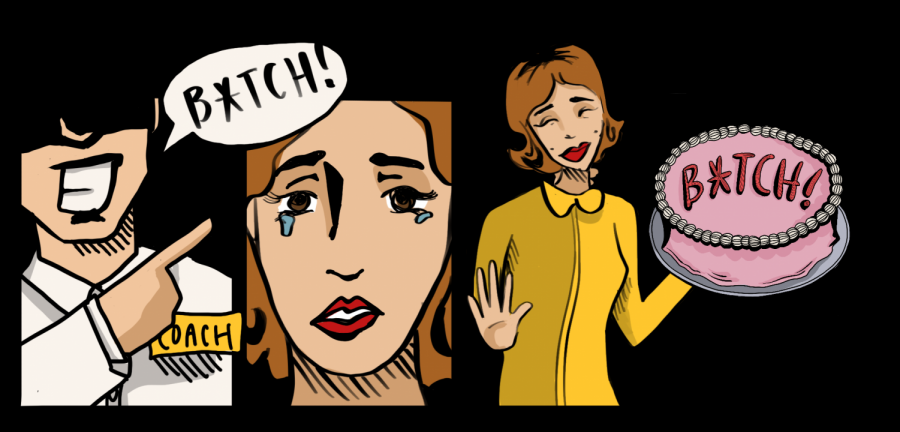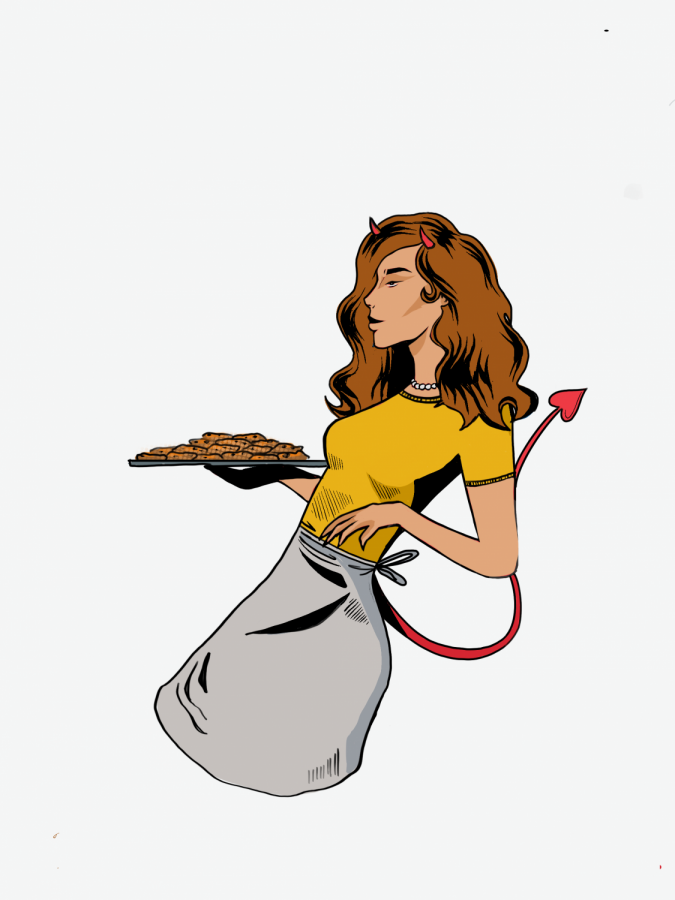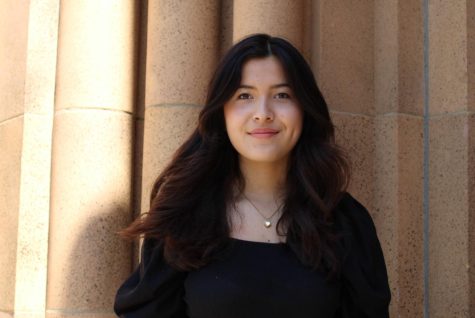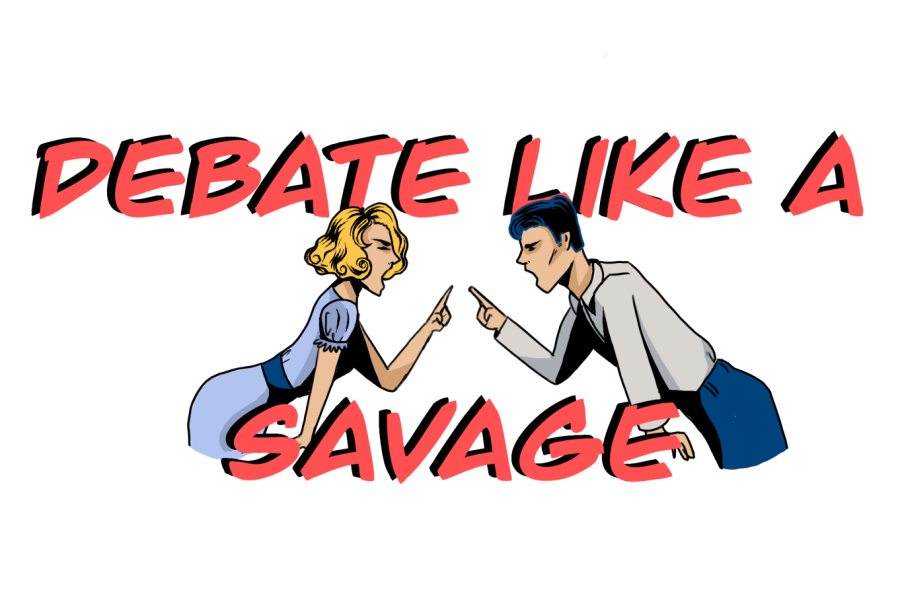Debate Like a Savage
In the competitive academic setting of high school debate, female competitors experience sexism and learn how to overcome barriers with the support of their coach

“You sounded like a b*tch.”
Standing in shock after hearing the feedback given to her by a parent volunteer judge, Paly alumna Candace Wang knew her coach, Jennie Savage, would have her back. Wang, a former competitor and coach on the Paly Speech and Debate team, still remembers this judge using incredibly sexist language when giving her feedback during a 2014 tournament. “In a debate where I got particularly passionate, I was talking and making my points, and I was probably being a little louder than normal because I really believed in [my] arguments,” Wang said. “On my ballot, [the judge] said that I sounded like a b*tch.”
According to the Paly Speech and Debate team’s director, Jennie Savage, these ballot comments are a widely discussed inequity among debaters. “There are entire websites devoted to [gendered terms on ballots],” Savage said. “Women in the debate community have started ‘ballot shaming’ or ‘judge shaming’ every time there’s a comment on a ballot like, ‘you know you were too aggressive during cross-examination.’ I’ve even seen ‘women shouldn’t wear pants, you need to wear a skirt,’ or ‘you know you’d look way better in heels than those flats you wore.’”

Comments like this one are all too familiar to girls who debate competitively. Gender discrimination has been embedded into the debate culture for decades due to the historical male domination of intellectual activities. Savage has worked tirelessly to ensure the young women on the Paly debate are not torn down by these comments, but instead own them to take away their power.
“B*tch cakes” is one of the team’s famous traditions, which began after a female debater’s experience with sexism at a tournament. In the female debater’s fifth undefeated round of the competition, a competitor called her a b*tch. Savage decided to use this experience to model the right way to handle inappropriate behavior. “I could see [that] her hands [were] shaking and she [was] trying not to cry,” Savage said. “I said, ‘I heard that you got called a b*tch, and I can’t tell you how proud I am of you.’ She looked at me with these huge eyes, and the whole table of 12 Paly debaters were all listening to me [with their] jaws dropping.”
Savage used this sexist comment to teach the team a valuable lesson. “I said [to them], ‘You realize they only call you a b*tch if you’re good because they don’t snipe at people who are below them, they snipe at people who are above them,’” Savage said. “‘I have been waiting for three years for one of my debaters to be called a b*tch. Finally, someone has, and I can’t tell you how proud I am.’”
After her speech, Savage felt that she still needed to do something to show the female debaters on her team that they had nothing to be ashamed of. “I made this big cake for [the female debater] that said ‘b, asterix, t, c, h!’ and I brought it into practice,” Savage said. “In front of the whole team, I said, ‘I want you to know this great thing happened to our team, we finally arrived. For a young team, we haven’t done well so far, but now we’re on the map, and we’re going to celebrate because people are gunning for us.’”
Not only did “b*tch cakes” become an infamous part of the Paly Debate team, but teams across the country have now adopted the practice. On the Paly team, the male debaters expressed feeling excluded by the b*tch cakes since they would never receive one. “I said, ‘Great, if you ever hear anybody from another team calling anybody else any kind of [gendered language], and if you can prove that you have stepped in and stood up for them and called them out on it, then you get a b*tch cake too,” Savage said. “So far, no men have earned this cake.”

As a coach, Savage has also experienced situations in which her gender led to discriminatory treatment; she remembers a specific instance from her earliest days of coaching when a male coach made inappropriate comments toward her. “He walked up to me and said, ‘I’ve been hearing that you’re the hottest coach now,’” Savage said. “He’s one of the best coaches in the country, and that’s how he chose to introduce himself to me and welcome me to the league, [by saying] something about my sexuality.”
Savage started coaching in her early thirties with a four-year-old son. When Savage’s team started dominating tournaments under her leadership, she was criticized by the coach and his colleagues. They mocked her for being a mother as well as a coach, and she was given the nickname “The Devil.” “How dare I, as an older woman, and as a [female] coach, start beating their team when they were younger, they were guys, they knew what they were doing, and I was just a housewife,” Savage said.
Savage herself was a competitive debater in high school. Savage began debating her sophomore year after the debate coach insisted she join the team. “Mr. Roberts was widely known to be the best teacher and the meanest teacher in school, and you just didn’t say no to Mr. Roberts ever, you said ‘yes sir,’” Savage said. “He cornered me in the hall one day as I was leaving eighth grade and said, ‘You’re going to join my debate team,’ and there was one thing I could say to him, and that was, ‘yes sir.’”
Despite not originally planning to join the team, Savage quickly grew to love debating. “It was a place for intellectual expression,” Savage said. “I’ve never been one to back down from a fight; in fact, I pick them.”
At the end of her first year on the team, Savage first experienced the sexism with which she would become extremely familiar throughout her career. One of her opponents handed Savage a note after she emerged victorious over a pair of male debaters at a tournament.

“I read it on the way home, and it was an extremely graphic ‘menu’ of our body parts with prices listed next to them,” Savage said. “It made me so angry, but also, at that point in my life, I just felt ashamed. I remember thinking, ‘I can’t tell my mother about this,’ about how they’ve hyper-sexualized me.”
When Savage told the male debater that she would tell his coach about the note, he responded that his coach knew the whole time. “They told me that [he knew all about it],” Savage said. “They said, ‘he thinks it’s hilarious, and he was the one he told us to give it to you.’”
Savage’s own experience reminds her of the experiences the girls on her team might currently be facing. “I thought that it meant that I was bad and [that] I’m just a person who comes across as too sexual,” Savage said. “There’s shame wrapped up in [being perceived that way], and it’s one thing I’m very aware of with my female debaters.”
After experiencing the sexism that female debaters face, Savage strives to provide the girls on her team with support and guidance. For example, Savage describes an experience in which a female debater’s mother was concerned with comments that her daughter would receive if she wore a shorter skirt to the tournament. Savage told the mother that she doesn’t believe in telling young women that they should avoid wearing certain clothing because of the inappropriate behavior of male judges and competitors. “If this is the way that she wants to present herself, I am all for it,” Savage said. “Don’t tell her to put more clothes on.”

Instead of telling her to cover up, Savage prepared her debater for the sexist comments she may face. “I said to [her], ‘you might get comments on ballots from male judges that you need to wear longer skirts,’” Savage said. “‘You might get comments on your ballots that are gender-specific, and you just need to be ready for it. You don’t deserve it. If it does happen, come to me, and we’ll deal with it. You have nothing to be ashamed of.’”
Current junior Meena Narayanaswami joined the Paly Speech and Debate team as a freshman. Throughout her time on the team, she has noticed that female debaters have very different tournament experiences than their male counterparts. “You go to tournaments, and you get looked down upon by your male debater peers,” Narayanaswami said. “Guys [are] so confident and willing to say whatever [is] on their minds without any actual factual basis to support them, while the girls on the team won’t say anything until we are 100% confident that it’s correct and we have evidence to back us up.”
Debaters go through their arguments each round and then receive comments on a “ballot” from the judges. These comments are often a reflection of the double standards that girls in debate face. “Even when I do win rounds, I definitely get a lot of comments [from judges] like, ‘you need to be nicer to your opponents,’ ‘you need to smile more,’ or ‘you need to be less aggressive with your opponents,’” Narayanaswami said. “I don’t see my male peers getting that quite often, or nearly as much as I do.”
Savage echoes Narayanaswami’s claim that there is a clear difference between the treatment of male and female debaters during tournaments. “When do men get told to smile more, or to defer to their opponents, or that they’re coming across as shrill?” Savage said. “I’ve never seen my male debaters called shrill or ‘too assertive.’”
Savage’s previous experience as a female debater has allowed her to create a safe, inclusive environment for everyone on the team. Her goal is to empower the young and impressionable women on the team. “[Savage] supports in such a way that makes you realize that you have a lot of power,” Wang said.
At the start of each debate season, Savage makes it clear that they have a zero-tolerance policy against any discrimination. Creating an inclusive environment is an active process, and it’s a process that takes time. “Making [the importance of inclusivity] very clear immediately sets this precedent for the entire team for the rest of the year,” Wang said.
The debate team offers many leadership opportunities, but girls do not often run for these roles. “[Savage] does a really good job of calling out some of the things that we’ve internalized as girls and as women,” Wang said. “We wait until we’re given something rather than going up and grabbing it. Every time I’ve ever tried to do something [on the team], [I think], ‘let’s do it, what’s the worst that can happen?’”
Savage’s leadership creates an environment where girls feel empowered and confident in their abilities. “Girls growing up forget that they are powerful, fierce and have a lot of say in what happens to and around them,” Wang said. “[Savage] reminds people of that.”
The challenges that girls face in debate provide many important lessons; Savage teaches girls how to be confident and assertive in a world where they have been taught to obey. “I think debate teaches you [that while] it’s okay if you’re wrong, it’s important to make your point [and] say how you feel,” Wang said.
“Sometimes that space for [girls] to talk isn’t going to be there,” Narayanaswami said. “You have to create it yourself.”
Savage teaches girls how to use their voice in an academic environment, which has historically excluded women. “Most girls are not taught to be outgoing, outspoken and assertive about their opinions,” Narayanaswami said. “Debate was a really positive experience for me in learning how to be okay with asserting my points and acting confident in what I was saying.”
However, the most important lesson that Savage teaches girls on the debate team is that the gender discrimination they face is not the result of their actions. “Debate gives you the understanding that it isn’t you,” Savage said. “There’s nothing that you did to draw that fire, except [being] a woman, and probably a successful woman.”
Art by Wallie Butler and Kellyn Scheel
Print Issue
Please click on the three vertical dots on the top right-hand side corner, then select “Two page view.”

2021-2022 - Staff Writer
2022-2023 - Editor-In-Chief
I joined C Mag because I love art, culture, and music, and I wanted to write about them! ...

2020-2021 - Staff Writer
2021-2022 - Social Media Manager
2022-2023 - Multimedia Director
I joined C Mag because I wanted to explore how art can...







